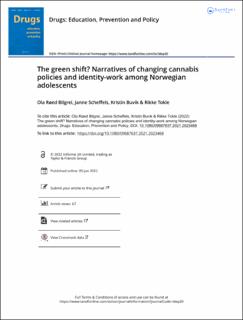The green shift? Narratives of changing cannabis policies and identity-work among Norwegian adolescents
Peer reviewed, Journal article
Published version
Permanent lenke
https://hdl.handle.net/11250/3009789Utgivelsesdato
2022-01-05Metadata
Vis full innførselSamlinger
Originalversjon
Drugs: education prevention and policy. 2022, 1-9. https://doi.org/10.1080/09687637.2021.2023468Sammendrag
Recent years have seen a growing public debate concerning the political regulation of cannabis products, substantiated by a multitude of competing narratives about the effects of various policies. However, little is known about how these ongoing discussions influence the meaning-making of cannabis use within wider contemporary youth cultures. Based on interviews with 80 Norwegian adolescents aged 16–17 years, this study explores narratives of changing cannabis policies and the type of work that these stories do in adolescents’ identity-work. The analysis illustrates that the participants relied on several narrative frameworks that were characteristic of the drug political discourse. Interlinked with two contrasting political identities – the progressive and the conservative – the adolescents presented stories of how various regulatory reforms would either increase or decrease levels of cannabis use, as well as discussions of relative drug harms, and how reforms would potentially lead to negative or positive health outcomes. As such, these political narratives not only informed the young people’s understandings of cannabis use, but also helped to position them within their broader social, cultural, and political surroundings. The study demonstrates how adolescents make selective use of the drug-political narratives that circulate within contemporary society to negotiate issues of personal identity.

